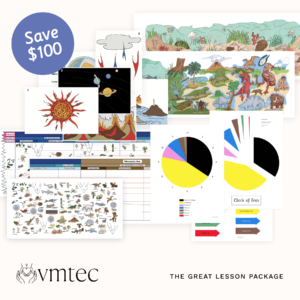Curriculum
What does Montessori teacher training cover?
Early Childhood Training Curriculum
Designed to be completed in 12 months, the course of study is a blended program, with one electronic week and 6 weeks of face-to-face instruction during the summer. Distance education meetings or face-to-face practice sessions will be held three times per month during the year. Approximately one week the following summer will include academic instruction, prep, and exams. A 540-hour Montessori internship at an approved Montessori school is required.
Curriculum in Minnesota and Virginia
Descriptions
Early Childhood Training Curriculum
Practical Life
37.5 clock hours
The theory of Practical Life as the foundation for all other curriculum areas is emphasized. The course presents the curriculum (Preliminary Exercises, Control of Movement, Care of the Environment, Care of the Self, Grace and Courtesy, and Food Preparation) through which the child becomes aware of his place in the environment, the implications of physical order leading to mental organization, respecting others and caring for himself/herself and the environment. Grace and courtesy, the development of motor skills, control of movement and the acquisition of concentration skills, self-confidence and independence are explored through purposeful activity.
Foundations and Theory
87.5 clock hours
This course provides the historical and philosophical foundations for understanding Montessori's view of human life and development: physical, intellectual, emotional, social and spiritual. The course will focus on the philosophical and educational theories that provide the basis of the Montessori method. The course will include the history of the method and how the philosophy evolved. Basic principles to be explored also include cosmic education, curriculum theory, Montessori classroom management, child development, the prepared environment and the preparation of the teacher. This is a blended course combining online instruction with face-to-face classroom instruction.
Language
37.5 clock hours
Receptive and expressive language development theory includes visual and auditory discrimination, vocabulary enrichment, oral language experiences, writing and reading. Interpretive reading skills, grammar studies, penmanship, creative writing, research and multi-cultural studies are included. Language touches every area of the curriculum as well as the social life of the class. The student is made aware of the child’s sensitivity to language and the importance of creating an environment which enriches and encourages language development and listening skills.
Math
37.5 clock hours
This course provides a detailed and thorough presentation of the math materials including a discussion of how the mathematical mind develops. Arithmetic, fractions, geometry, algebra are presented as “materialized abstractions”, sensory-based concrete activities that lead the child to abstraction. Beginning counting, the decimal system, linear and skip counting, memorization of facts as well as an introduction to the transition materials for elementary. Supplemental math concepts, including fractions, measurement, money and time, are presented.
Cultural
30 clock hours
This course presents the study of geography and science for the child age 3-6. The foundation is laid for an understanding of world geography and different cultures through work with water and land forms, puzzle maps, flags and geography folders. The student will learn the fundamentals of zoology, botany, and physical science both in the classroom and outdoors. Observation of scientific phenomena through simple experiments using the child’s intrinsic interest will be presented. A study of time using calendars, the clock, and personal time lines enhances the child’s awareness of the passing of time.
Sensorial
37.5 clock hours
Sensorial theory and rationale act as the base for intellectual education. The student will understand Montessori’s approach to differentiated instruction through the developmental refinement of the senses through use of Montessori Sensorial material. Montessori believed visual, muscular/tactile, olfactory, gustatory and auditory exploration through the use of concrete materials and experiences enable children to explore the world via the absorbent mind. Students will learn to identify how to translate a child’s sensitivity for learning into practical application thorough use of the Montessori materials. Students will understand that a multi-sensory approach to education will benefit all types of learning styles. Students will learn how to design and implement multi-sensory curriculum into their classroom environment. Classification and organization of these experiences will allow the child to internalize concepts resulting in the development of the mathematical mind.
Montessori Leadership
7.5 clock hours
This intensive course will focus on five areas of management in the Montessori classroom. These areas are Managing the Environment, Managing the Work, Managing Planning and Records, Managing Time, and Managing Behavior. As a part of Managing Planning and Records, particular emphasis will be placed on developing Montessori curriculum and Montessori oriented lesson plans, lesson giving schedules, follow-up records, and student notebooks.
Art and Peace Education
22.5 clock hours
Art is presented as exploration of media and a means to self-expression with an emphasis on variety. The process of an art activity rather than the product is emphasized. A cultural and historical component is included. Peace, as an essential element of a Montessori classroom, is taught through role-playing, art, meditation and various other activities and routines.
Music and Movement
22.5 clock hours
The study of early childhood music and movement is presented as developmental process of absorption, exploration, and self-expression, with an emphasis on various present and historical cultures. Physical Education is presented as Movement, which may include the development of the body through exploration, cooperative play, rhythms and dance.
Early Childhood Seminars and Projects
42.5 clock hours
Attendance is required at a supervised weekly practicum seminar with materials, including spontaneous problem solving and support sessions bi-weekly throughout the school year. Practicum seminar will include utilizing Montessori materials and problem solving sessions. One session will be face-to-face, the other session will be held on Zoom. Out of town students must connect on Zoom for all sessions.
